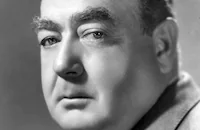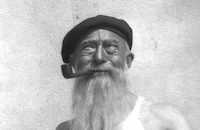Playboy of Paris
Cast & Crew
Ludwig Berger
Maurice Chevalier
Frances Dee
O. P. Heggie
Stuart Erwin
Eugene Pallette
Film Details
Technical Specs

Synopsis
Yvonne, daughter of Philibert, a Paris cafe owner, is in love with dreamy, blundering Albert, a waiter, though he pays little attention to her. Philibert plans to marry his daughter to a wealthy Parisian, but upon learning that Albert is to come into a large inheritance, he conspires to place him under a longterm contract, confident that he willingly will pay a forfeit to break it. Albert, however, elects to remain a waiter by day and devote his nights to a gay social life with Berengère, a gold digger; he drops dishes and insults patrons, but Philibert will not descharge him. Angrily, Yvonne follows him to a rendezvous with Berengère at a restaurant and denounces him as a waiter, precipitating a fight between the two girls. Albert defends Yvonne aginst another gentleman and is challenged to a duel--but the man refuses to fight a waiter. Insulted, Albert slaps him, but Yvonne faints from fright, and all ends happily as Albert realizes his love for her.

Director
Ludwig Berger
Cast

Maurice Chevalier

Frances Dee

O. P. Heggie

Stuart Erwin

Eugene Pallette
Dorothy Christy

Cecil Cunningham
Tyler Brooke
Frank Elliott

William B. Davidson
Erin La Bissoniere
Charles Giblyn
Frederick Lee

Edmund Breese
Olaf Hytten
Edward Lynch
Guy Oliver
William O'brien
Crew

Film Details
Technical Specs

Articles
Frances Dee (1907-2004)
She was born Jane Dee, on November 26, 1907 in Los Angeles, California. She was the daughter of an Army officer who grew up in Chicago after her father was transferred there when she was still a toddler. After he was re-stationed to Los Angeles in the late '20s, Jane accompanied him back.
Although she didn't harbor any serious intentions of becoming a star, Dee, almost out of curiosity, found work in Hollywood as an extra. With bit parts in small features in the films Words and Music (1929), True to the Navy, and Monte Carlo (both 1930), it didn't take long for studio executives to take notice of the sleek, stylish brunette. They changed her first name to Francis, and gave her a prominent role opposite Maurice Chevalier in one of the first all-talking musicals, The Playboy of Paris (1930).
She proved she could handle drama in her next big hit, An American Tragedy (1931) as Sondra Finchley, the role played by Elizabeth Taylor in the George Stevens' remake A Place in the Sun (1951). She met her husband Joel McCrea while filming The Silver Cord (1933), and after a romantic courtship, were married that same year in Rye, New York. It was well-known within film industry circles that their 57-year marriage (ending in 1990 when McCrea passed away) was one of the most successful among Hollywood stars.
From there, Dee played important leads in several fine motion pictures thoughout the decade: Little Women (1933), starring Katharine Hepburn; Blood Money (also 1933), where she was cast thrillingly against type as a sex-hungry socialite whose taste for masochistic boyfriends leads to harrowing results; Of Human Bondage (1934), in which she played Leslie Howard's devoted girlfriend; The Gay Deception (1935), a charming romantic comedy co-starring Frances Lederer; Wells Fargo (1937) a broad sweeping Western where she again teamed up with her husband McCrea; and the classic period epic If I Were King (1938) making a marvelous match for Ronald Colman.
Dee's film career slowed considerably in the '40s, as she honorably spent more time raising her family. Still, she was featured in two fine films: the profound, moving anti-Nazi drama So Ends Our Night (1941) with Fredric March; and Val Lewton's terrific cult hit I Walked with a Zombie (1943), portraying the inquisitive nurse trying to unravel the mystery of voodoo occurrences on a West Indian plantation. Dee officially retired after starring in the family film Gypsy Colt (1954) to commit herself full-time to her children and her husband.
For those so inclined, you might want to check out Complicated Women (2003), a tight documentary regarding the racy Pre-Code films that represented a realistic depiction of the Depression-era morality before the Hays code took over Hollywood in 1934. Frances Dee, although well in her nineties, offers some lucid insight into her performance in Blood Money, and clearly demonstrates an actor's process of thought and understanding in role development.
She is survived by three sons including the actor Jody McCrea, who found fame as "Bonehead" in the AIP Beach Party films of the '60s, six grandchildren and two great-grandchildren.
by Michael T. Toole

Frances Dee (1907-2004)
Quotes
Trivia
Notes
This film was also produced in a French-language version, Le petit café.














